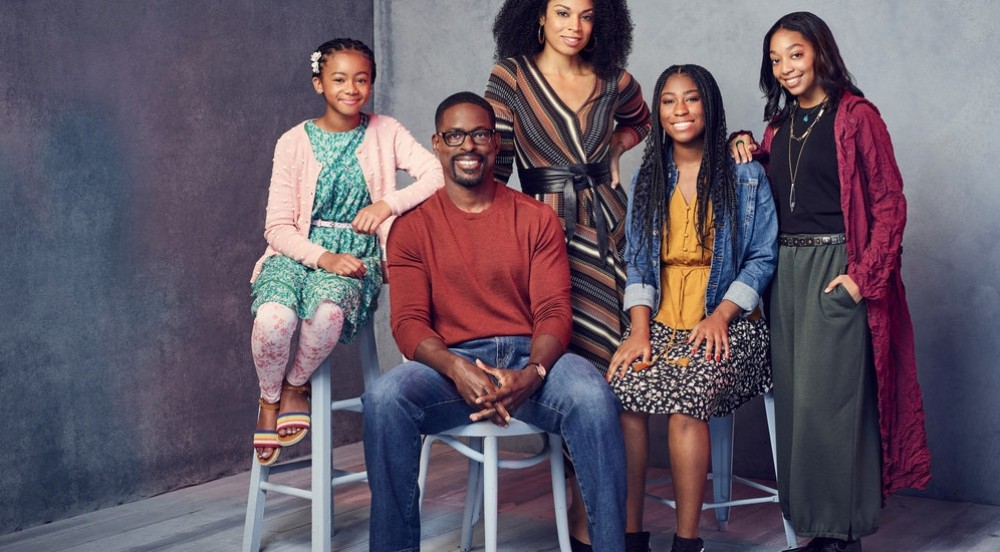When This Is Us premiered back in 2016, Sterling K.Brown was coming off an Emmy win for playing Christopher Darden in the hit limited series The People vs. O.J. Simpson just days before. Although he had been a series regular on Army Wives, which ran for seven seasons, to most TV viewers he was largely unknown. But that was true for almost everybody in the cast. The real challenge was much greater.
Back then the prospect of garnering a Black following for a storyline ostensibly about white parents raising their biological twins, once triplets, and an adopted Black baby boy born the exact same day didn’t seem too promising. Not because the storyline itself is that far-fetched; a number of Black kids are indeed being raised by white parents. (Charlize Theron’s Jackson and August, and Angelina Jolie and Brad Pitt’s Zahara are just a few famous examples.) Instead, the skepticism came from how television had traditionally handled the “Black” storyline in a drama where white people have been prominent. Essentially, the Black character and storyline had rarely been flushed out; they existed only to support their white counterparts, not to live their own lives.
With Brown’s Randall Pearson and his wife Beth (Susan Kelechi Watson), along with their biological daughters Tess (Eris Baker) and Annie (Faithe Herman), Randall’s biological father William (Ron Cephas Jones), adopted daughter Deja (Lyric Ross), Beth’s cousin Zoe (Melanie Liburd), Beth’s mom Mama C (Phylicia Rashad), we got more from Black people than we had arguably ever gotten before on traditional broadcast TV. We got full storylines with older and younger versions of Randall at different stages of boyhood with Lonnie Chavis as the much younger version and Niles Fitch as the teenage, young adult. The backstory of Randall’s biological parents, with discovering his dad only to lose him way too soon and learning about his mom and all the factors that led to them not keeping him, is not one that “Black” characters have traditionally gotten on TV.
Neither is the adoption of Deja. In her mother Shauna (Joy Brunson), we saw a young woman struggling to care for a child she loved but didn’t have all the emotional as well as other resources to properly care for her. Like so many real-life people in similar predicaments, Deja’s great-grandmother Gigi, played by icon Pam Grier, was the critical glue that kept them functional. But, sadly, people don’t live forever. Even more important, Deja’s adjustment to adoption, even by a Black family, was not smooth. The series didn’t shy away from the ugliness that leads to the joy or just the fullness of what family, any family, is.
On top of that, we got to see two sides of Deja, two sides of Black girlhood—one in which she was not a child and the other where she got the freedom to be.
And then there is the “Black Love” story. In Randall and Beth, we got to see what real relationship goals look like. So often, we haven’t seen the love story of Black characters on shows in which, again, white characters are so prominent. But, with Beth and Randall, we saw courtship and, most importantly, undying devotion. Their challenges as a married couple didn’t come from infidelity or other bombshells so often used in TV shows to create drama. Instead, life challenged them as it does us all—and in unexpected ways too. Their commitment to each other, however, is what shined through.
This Is Us’ Black Pearsons were not just reduced to race. Randall was not just there to make Kate and Kevin or even Rebecca and Jack feel better about themselves. Instead, they were just simply real people. Be it struggles with identity, anxiety, sexuality, family tension and more, they were able to tackle it as active participants, not well-meaning bystanders.
You name the very human challenge, and This Is Us had Randall and his family address it. Who doesn’t have tensions with their siblings, disagreements with their significant others, unruly cousins, or even gay family members? What family hasn't been affected by drug addiction? The series addressed it all in a very authentic way.
And it did this to the very end, to the very last episode. Regardless of who you are, the loss of any parent is hard. Randall lost both his fathers—Jack (Milo Ventimiglia), who frankly gave us all hope not just for white men but humanity in general, and William. And he got through all of that because he still had his mother Rebecca (Mandy Moore) and, of course, his wife Beth. Sadly, he never knew his biological mother, but he did find out that she loved him desperately and the most horrific of circumstances kept her away. Still Rebecca was his last anchor from boyhood to adulthood and, as expected, it was hard. The beauty, however, is that the family he built rallied around him. It’s a picture we still don’t see often enough.
“Hopefully you walk away from This Is Us having felt seen in a way that you probably haven’t felt seen before,” said Kay Oyegun, one of the series' executive producers.
And, indeed it did.
Ronda Racha Penrice is the author of Black American History For Dummies and editor of Cracking The Wire During Black Lives Matter.













